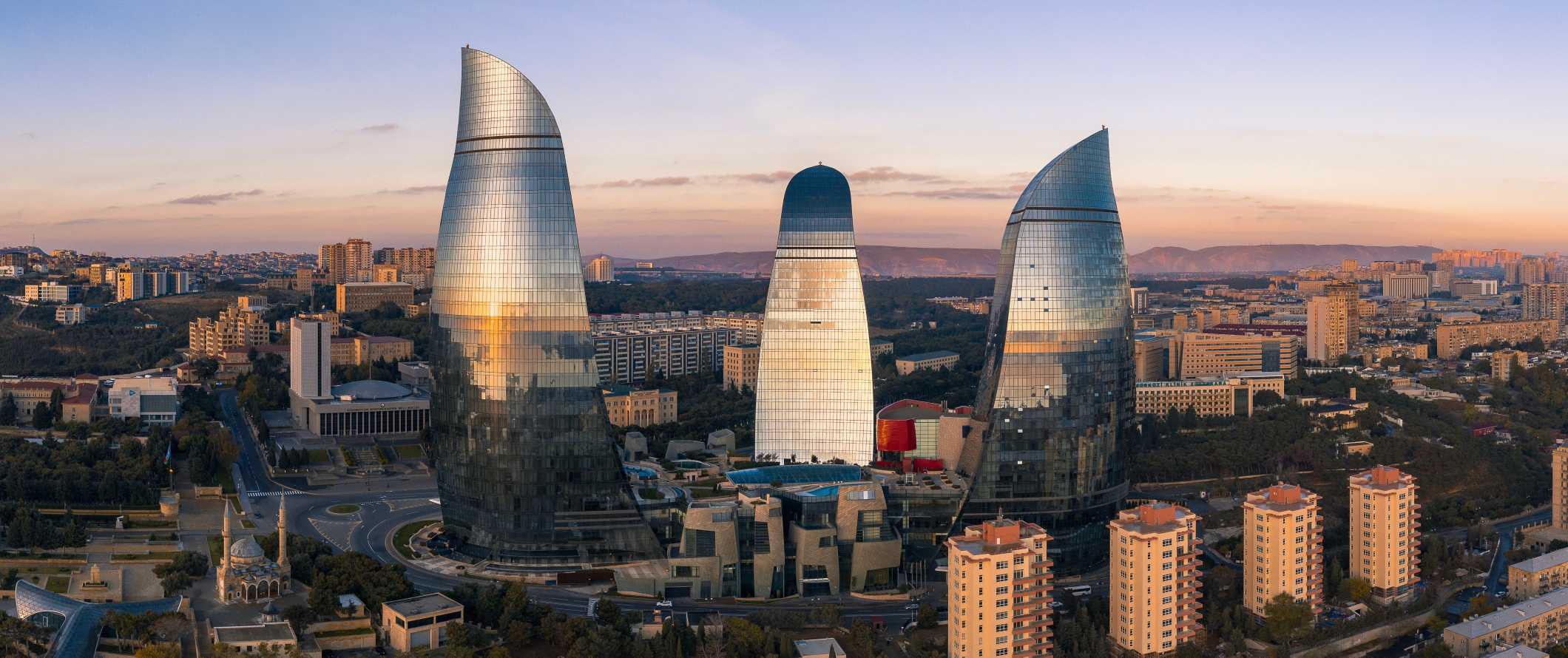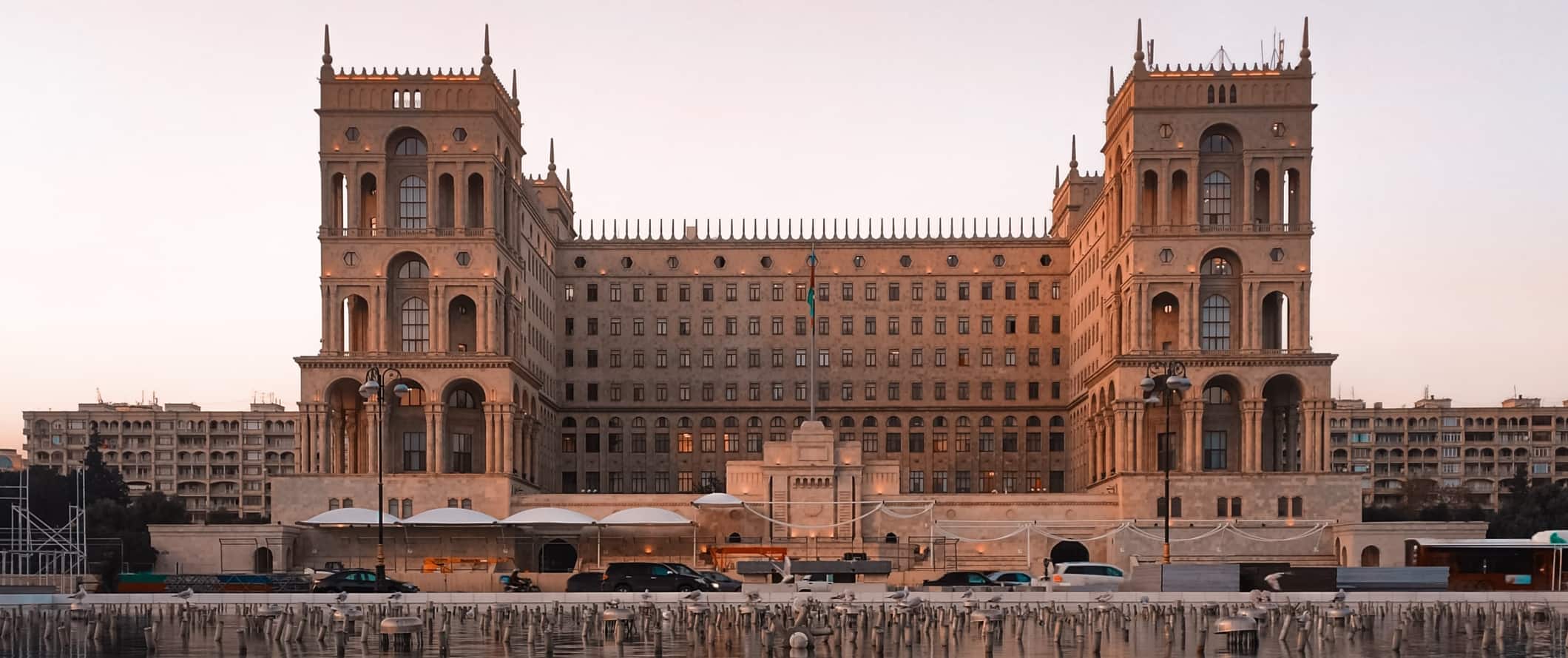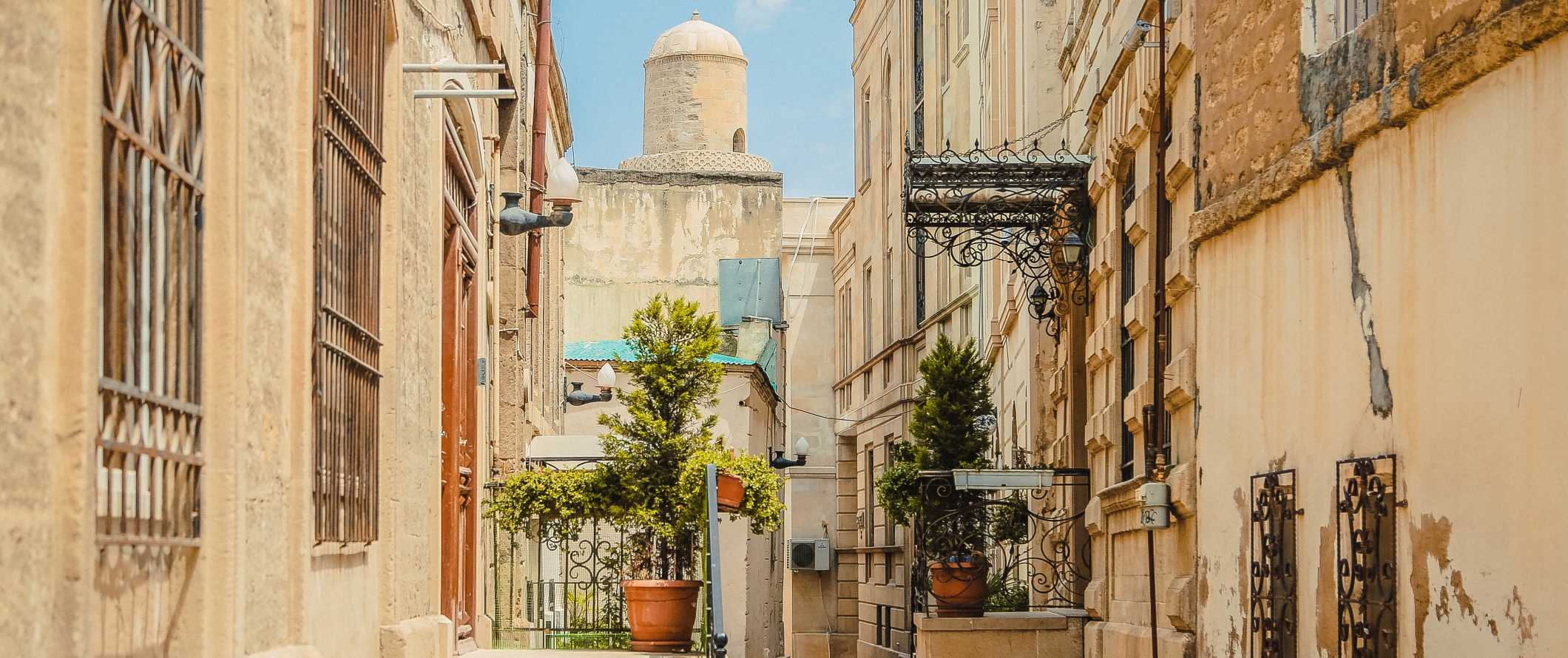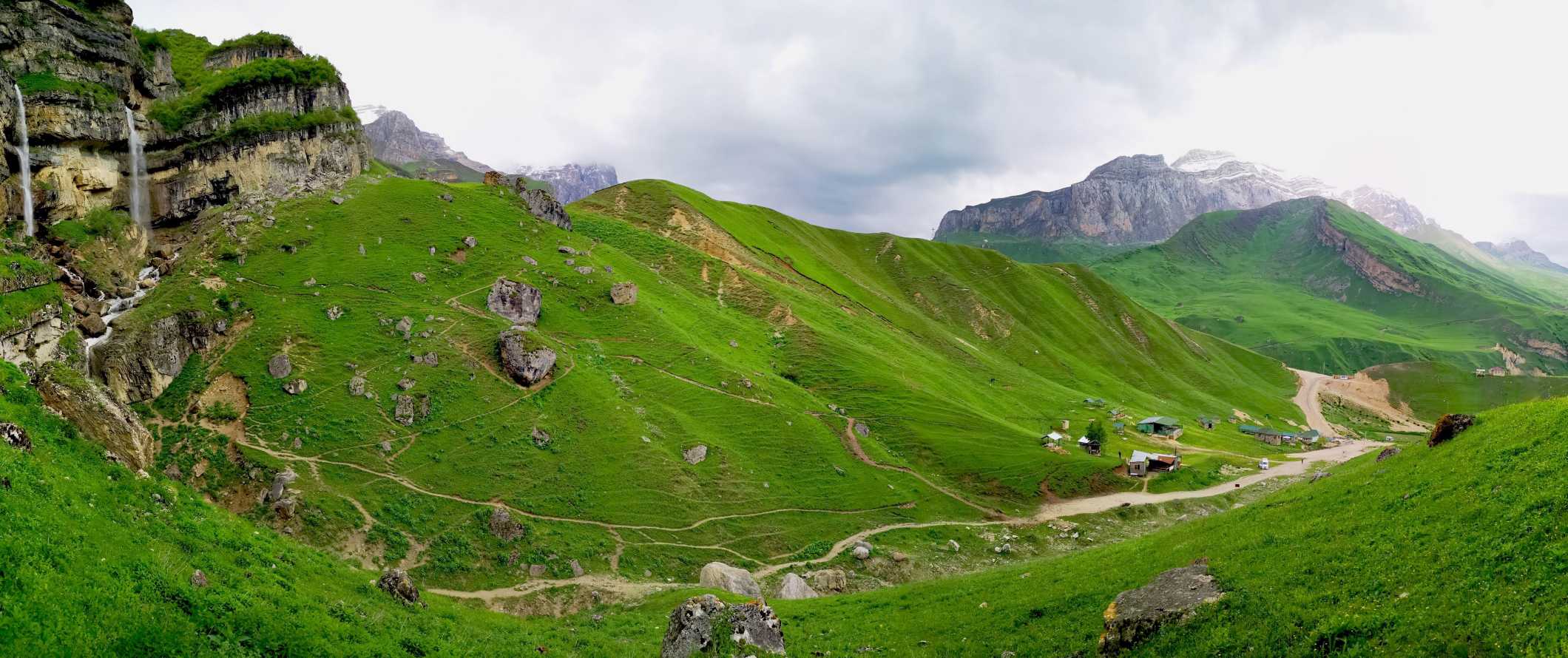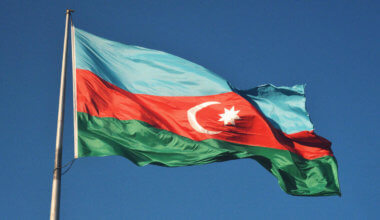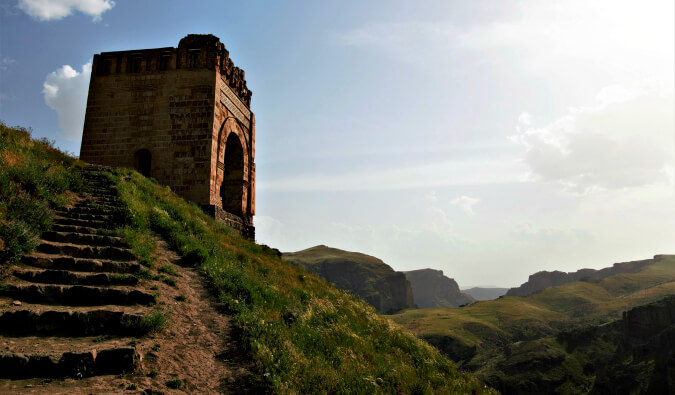Dubbed “the land of fire,” Azerbaijan is a former Soviet republic famous for its high-tech capital city of Baku, the Great Caucasus mountains, and strange fire phenomenon of Fire Mountain (hence the country’s nickname).
I knew two things about Azerbaijan before I visited: it won the Eurovision Song Contest in 2011 and it has a lot of oil money.
Though a very rural and quiet country, when I backpacked around Azerbaijan, I found it to be one of those “undiscovered gems” that too many people skip — especially if you want to get out and hike without crowds!
Azerbaijan is an amazing, wonderful, beautiful, and friendly place. The country became the world’s first secular democratic Muslim-majority state when it first declared independence in 1918. Today, Baku, the capital, is a modern city steeped in oil money with a recently built subway, fast Wi-Fi, and tons of Parisian-style buildings (in the 1900s, newly rich oil barons modeled the city after Paris) as well as towering and futuristic steel and glass buildings.
The rest of the country is incredibly rural with small towns surrounded by gorgeous mountains and farmland. In tiny villages, old men with canes sat in town squares gazing at passersby’s like out of some movie. Locals, who don’t see many visitors, are very welcoming.
From things to do, costs, ways to stay safe, save money, how to get around, and more, this travel guide to Azerbaijan will help you plan your trip and ensure you make the most of your time in the off-the-beaten-path destination!
Table of Contents
Top 5 Things to See and Do in Azerbaijan
1. Explore Baku
Baku, the capital city of Azerbaijan, lies along the Caspian Sea and is a somewhat curious mix of old walled city and modern skyscrapers. It’s a cool small city that only needs a day or two. There’s good food, interesting museums, and amazing wine bars. The Old Town, called Icherisheher, is a maze of cobblestone streets where you’ll find museums, art galleries, mosques, and two landmarks—Maiden Tower and Shirvanshahs’ Palace. Restaurants and rooftop bars have great views over the waterfront, where you can stroll on Baku Boulevard and take a ride on the Baku Eye Ferris wheel. Architecture buffs won’t want to miss the Zara Hadid-designed Heydar Aliyev Centre, a museum focused on Azerbaijani art and culture; and the Carpet Museum, in a clever building shaped like a rolled-up carpet. The most prominent examples of modern architecture are the three iconic Flame towers—LED-covered skyscrapers that curve at the top.
2. Visit Sheki
The city of Sheki was a famous stop on the Silk Road, and the large old caravanserai (inn with a courtyard) dating to the early 18th century still stands today. Built like a castle to protect merchants (high walls, one gate), you can stay there today for around 50 AZN per night. Silk is still produced in the well-preserved historic town center where you can also see craftsmen at work. The city is known for its colored glass mosaics called shebeke, which are set in wooden lattice framework without glue or nails. With a facade covered in shebeke, Sheki Khan’s Palace is worth a visit to see the intricately patterned frescoes, ceramics, and other ornate decorations in this former summer palace.
3. Go to Lahij
Lahij is beautiful, with cobblestone streets and stellar views of the valley. A tiny, remote town, Lahij’s mountainous location makes it a popular summer destination for people looking to escape the heat of lower elevations. Known for coppersmithing, Lahij artisans have perfected the art of handcrafting and engraving plates, cookware, water vessels, and other items. Other handmade items from tin and leather are sold in shops where you can often see two or three generations at work. There a lot of hiking trails and activities around that you can do too. You’ll find some castle ruins on the trail leading up from the nearby river and waterfall but be warned: it’s a steep 6 kilometers (3.7 miles) up and the ruins (really just a wall) are easily missed.
4. See the Gobustan Petroglyph Reserve
The UNESCO-listed Gobustan Petroglyph Reserve is home to 6,000 rock paintings that are up to 40,000 years old. The well-preserved sketches display ancient populations traveling on reed boats, men hunting antelope and wild bulls, and women dancing. Unique to Gobustan is that the petroglyphs date from the Mesolithic Era to the Middle Ages and document life over the centuries. The area, including tombs and caves, has provided archaeological findings like jewelry and weapons that you can see in the Gobustan Museum.
5. Visit Ateshgah
Ateshgah is a temple just outside Baku that has been used as a Hindu, Sikh, and now a Zoroastrian place of worship. Each room has panels detailing the temple’s history and the Zoroastrian religion. In the complex center is a naturally occurring, unquenchable flame representing God that has inspired pilgrims for millennia. Enclosed by stone walls in the shape of a pentagon, the fire altar is in the middle of the courtyard. About 19 miles from Baku, which has long been called the City of Fire, it’s open daily. Admission is 4 AZN.
Other Things to See and Do in Azerbaijan
1. Check out the mud volcanoes
Azerbaijan is home to nearly a third of the world’s mud volcanoes, which form when pockets of underground gas force their way to the surface. They’re like geysers, but with mud, and since they’re not made from magma, the mud is pretty cold (just above freezing temperature). Of the country’s 700 mud volcanoes, 350 are active and range from little bubbling pools to entire islands like Dashli that were formed by mud eruptions and also have mud volcanoes. The ones at Gobustan National Park are the most popular to visit from Baku on a day tour (it’s possible to take a bus to the park’s entrance but finding the volcanoes isn’t easy). Half-day tours start from about 60 AZN.
2. Tour the Sheki Khan’s Palace
The Sheki Khan’s Palace was built in 1797 and was once the summer residence for the Khans. It is one of the most ornate and iconic buildings in the South Caucasus. Its shebeke windows (incredibly delicate stained glass with geometric patterns made specifically by Azerbaijan masters) cast brilliant rays of colored light across the entire interior. The palace opens daily from 10am-6pm and costs 2 AZN or 5 AZN with a guide.
3. See the Palace of the Shirvanshahs
Within Baku’s walled Inner City is the 54-acre limestone Palace of the Shirvanshahs. Surrounded by walls and topped by domes, the sprawling palace complex was built in the 15th century and includes a mosque with a 16-meter (52 foot) minaret, bathhouse, mausoleum, ancient bathhouse ruins, and an octagon-shaped tomb known as the “Dervish’s Tomb.” The complex features grand gates adorned with intricately carved arabesques, doorways covered in Arabic scripture, magnificent domes, and courtyards with octagonal reflecting pools. Inside, there are displays of traditional artifacts such as clothing, jewelry, ancient texts, weaponry, and more. The famous 12th-century Maiden Tower, an iconic Azerbaijani monument with Arabic, Persian and Ottoman influences, is here too. Standing at over 29.5 meters (97 feet), it offers panoramic views of the city from the top. (Fun fact: They still have no idea what this tower was built for, though over 20 legends attempt to explain its purpose.) The Palace is open daily from 10am until 6pm and admission is 2 AZN or 6 AZN for a guided tour.
4. Relax on the beaches of the Absheron
During the summer, the residents of Baku migrate to their country houses (known as dachas) on the Absheron Peninsula to escape the city heat. In recent years, thanks to the resorts popping up along the coast, tourists are following suit. The public beaches at Mardakan or Buzovna are two popular choices for sunbathing and swimming in the warm waters of the Caspian Sea.Restaurants specialize in fish, and you can rent an umbrella or tent and purchase refreshments like tea and watermelon from beach vendors.
5. Go hiking in the Guba region
The Guba or Quba region, located 2 hours north of Baku, is a remote region famous for its traditional villages, rolling apple orchards, and mountainous landscapes perfect for lots of hiking. Tenghi Canyon is popular to visit, as is Khinalig, a major Zoroastrian center. Krasnaya Sloboda, the only all-Jewish town outside of Israel, is populated by the Juhuro, or Mountain Jews. Although you can travel here and hike independently, many companies offer organized day tours of the region, for around 53-115 AZN.
6. Hit the slopes
Azerbaijan may not be known internationally for its skiing, but it does have two winter resorts that offer an “off-the-beaten-path” winter experience: Shahdag Mountain Resort and Tufandag Mountain Resort. The ski season is very short, lasting just two months from mid-December to late February. A ski day pass costs about 25-35 AZN. Ski lessons cost around 40 AZN per lesson. Shahdag offers an Alpine Coaster thrill ride and snowshoeing while Tufandog’s observation deck that juts out over a cliff and its 22- and 65-foot swings attract Instagrammers with no fear of heights year round.
7. Go to Quba
Head north by bus to the mountain town of Quba for a cooler climate, old mosques, and traditional carpet weaving in beautiful alpine surroundings. Home to less than 40,000 people, there are dramatic panoramic views everywhere you turn, with pastel-colored houses and red-tiled roofs standing out against the lush verdant mountains. Nestled on the slopes of Shahdag mountain on a flowing river, Quba remains similar to 19th-century Azerbaijan. While you’re here, make sure to visit the Quba Genocide Memorial Complex, which is dedicated to the memory of the 12,000 Azerbaijanis who were killed by the Bolsheviks and Armenians during the March Days genocide that took place in 1918.
8. See Qabala
Once strategically located along the middle of the Silk Road, this dusty, old, not-so-small town is named after the nearby Gabala village. The walled town, dating back to the 4th-century, used to be the ancient capital of Caucasian Albania. As such, there are many ancient monuments and archaeological sites here, including a thousand-year-old defense tower, a 4th-century temple, a 13th-century mosque, and a mausoleum. The area is also home to wonderful hiking trails, beautiful waterfalls, dense woodlands, lakes, and one of the best ski resorts in the country. Take an early bus from Sheki and spend the night here. All the attractions are close together so you can easily see the town in a day.
9. Hang out in Ganja
Azerbaijan’s third-biggest city dates to the 6th century and features many attractions, historical sites, and parks. Main attractions include the 18th-century Shah Abbas Caravanserai (similar to the one in Sheki), traditional mosques and churches from the 14th-19th centuries, the domed, red-bricked 17th-century Chokak Hamam, the 19th-century Khan Gardens, and the Tomb of Nizami Ganjavi, the country’s most famous 12th-century poet (he’s kind of a national hero). The most important museum here is the Ganja State History-Ethnography Museum where you can learn the history of the region from ancient to modern times through its displays of over 30,000 artifacts and objects. For a quirkier thing to see, visit the Bottle House, a private residence built in the 1960s and covered in over 48,000 glass bottles.
10. Visit Lankaran
This sleepy resort town on the Caspian Sea is home to the Old Prison and Lighthouse (Stalin was a prisoner here for a while), an ancient bazaar, an 18th-century fortress, and a 19th-century mosque. You can spend a good day sightseeing here and then another on the beaches further south in Kenaramesha. If you have more time, take a day trip to the Ghizil-Agaj State Reserve, which is home to some 250 bird species.
11. Skip Yanar Dag (aka the “Fire Mountain”)
Yanar Dag (Fire Mountain or Burning Mountain) is a natural gas fire that blazes continuously on a hillside just outside Baku. Marco Polo once described the land in this area as being on fire because of phenomena like this, but this is one of the only fires left in the region. It’s small, so I wouldn’t make the journey specifically to see this, but it’s included in most tours of the region anyway.
Azerbaijan Travel Costs
Accommodation – There are only a handful of hostel options in Azerbaijan. A bed in a 4-6-bed dorm costs around 26-32 AZN per night in Baku and 10-20 AZN anywhere else. Prices in Baku are generally higher than elsewhere around the country.
A private room in a hostel is around 40-80 AZN per night. Most hostels have self-catering facilities, Wi-Fi, and free breakfast.
Budget hotels and guesthouses are much more common in the country. These cost around 60-85 AZN per night for a double room that includes breakfast.
Airbnb is available in Azerbaijan, with private rooms starting around 25 AZN per night while entire homes and apartments cost at least 80 AZN per night.
Wild camping is legal in Azerbaijan so feel free to pitch your tent anywhere, apart from a few national parks where it is forbidden (including Shirvan, Ag Gol or Absheron National Park). If you prefer to stay at a campsite with amenities, there are some campgrounds scattered around. You won’t find any online booking though, so keep your eyes peeled for signs when you get to a new place.
Food – Azerbaijani cuisine is a blend of Mediterranean and Middle Eastern flavors and is usually heavily spiced, aromatic, and vegetable-rich. Many traditional cooking methods (such as using copper or clay cookware) are still in use today. For meat, mutton, lamb, and sturgeon are the most comm, while vegetables widely used include eggplant, cucumber, red pepper, and tomato.
Dining out is very affordable in Azerbaijan. Street food like döner kebabs cost 2-3.50 AZN. Fast food like McDonald’s costs about 9 AZN for a combo meal while a whole pizza is 7.50-11 AZN.
A meal at a restaurant serving traditional cuisine is around 7-11 AZN. Look for traditional meals like plov, or pilaf, which uses saffron-flavored rice, fried meat, and vegetables. This is usually shared and costs around 10-12 AZN for a large plate. Cold starters, such as hummus or salads, cost 3-7 AZN. Traditional soups, of which there are many varieties, are around 3-5 AZN.
“Western” food is more expensive, with main dishes (such as a burger) costing around 16-18 AZN. Fish or steak dishes are generally around 25-40 AZN. A three-course meal at a higher-end restaurant costs about 50 AZN.
For drinks, you can expect to pay 2-4 AZN for a beer or soda, 6-8 for a glass of wine, and 8-10 AZN for a cocktail. A cappuccino is around 4-5 AZN.
If you are planning to cook your own food, a week’s worth of basic groceries costs 50-70 AZN but since most places don’t have kitchens, you’re better off just buying snacks and grab-and-go meals if you don’t want to eat at a restaurant.
Backpacking Azerbaijan Suggested Budgets
If you are backpacking Azerbaijan, my suggested budget is 85 AZN per day. This covers staying in a hostel dorm, eating street food, cooking some meals, visiting a few attractions like museums and palaces, and using local transportation to get around.
On a mid-range budget of about 175 AZN per day, you can stay in a private hostel room or Airbnb, eat out a lot more, take some guided tours, enjoy a few drinks out, take some taxis, and visit more paid attractions.
On a “luxury’ budget of 375 AZN or more per day, you can stay in hotels, get a rental car, eat out for all your meals, drink as much as you want, and do all the activities and tours you want. This is just the ground floor for luxury though — the sky is the limit!
Azerbaijan Travel Guide: Money-Saving Tips
Baku can be kind of expensive but, once you leave the capital, prices drop considerably and it’s easy to see a lot and spend a little. Here are some additional ways to save money when you visit Azerbaijan:
- Take a free walking tour – While in Baku, take a free walking tour to familiarize yourself with the city. I recommend using Baku Free Tour.
- Wild camp – It’s free to wild camp in Azerbaijan, so bring a tent and camp just about anywhere you like!
- Cook your own meals – Some hostels here don’t include kitchen facilities, so if you want to save money, make sure you book accommodation that does. Buying your own groceries may not be as glamorous as going out to eat, but it will save you money!
- Stay with a local – If you plan ahead, you can usually find nice Couchsurfing hosts throughout the country if you look in advance. This way, you not only have a place to stay but you’ll have a local host that can share their insider tips and information!
- Walk everywhere – All of the major towns and cities in Azerbaijan are quite walkable, so skip the public transportation (and the taxis) if you want to save a few extra dollars.
- Enjoy the free spaces – There are plenty of free parks as well as many free hiking trails around the country. Save your budget and enjoy the outdoors!
- Bring a water bottle – The tap water here is generally not safe to drink so bring a reusable water bottle to save money and reduce your plastic use. LifeStraw is my go-to brand as their bottles have built-in filters to ensure your water is always clean and safe.
Where to Stay in Azerbaijan
Azerbaijan had a boom in 4-5-star hotels during the first influx of tourism, but today there are more budget-friendly accommodations available for backpackers. New hostels are popping up all the time, but most of them are still in Baku. Here are some of my favorite places to stay in Azerbaijan:
- Sahil Hostel (Baku)
- Travel Inn Hostel (Baku)
- Hostel Ilgar (Sheki)
How to Get Around Azerbaijan
Public Transportation – Public transportation prices vary by city, but expect to pay around 0.20 AZN for a standard ticket for the bus.
Baku has a subway system that costs 0.30 AZN per ride. You need a prepaid smart card, called BakiKart, to access the metro. The card itself costs 2 AZN and you can refill it as much as you like.
If you need to take a taxi, prices start around 1.89 AZN and costs around 0.60 AZN for every kilometer.
Bus – Buses and minibuses (marshrutkas) are the most common options for intercity travel. Marshrutkas are the local favorite for getting around, so you can always find one that goes wherever you need to go. They run on general timetables, but usually just leave whenever they are full. Expect to pay about 2 AZN for an 80-kilometer (50-mile) trip. Going from Baku to Quba is around 160 kilometers (100 miles), takes around 2-3 hours, and costs 5 AZN. You usually pay the bus driver directly, but be sure to check at the stations, especially larger ones.
Trains – Trains in Azerbaijan are a lot slower and less frequent than buses; however, if you’re not in a rush, night trains can be an excellent option to save on a night’s accommodation.
Baku connects directly with Tbilisi, Moscow, Rostov, Kiev, Kharkiv (Ukraine), Brest (Belarus) as well as towns and cities within Azerbaijan. It is possible to travel across Azerbaijan overnight in a reserved sleeping berth for as little as 9 AZN. Booking in advance is advisable during the peak season to ensure you can reserve a bunk.
For detailed information on the trains in Azerbaijan and to book, use TuTu.
Budget Airlines – The main airline that services all major cities in Azerbaijan is Azerbaijan Airlines. However, unless you are pressed for time, I wouldn’t fly. It’s a hassle, expensive, and flights are infrequent.
Car Rental – Car rentals can be as low as 60 AZN per day for a multi-day rental when booked in advance. If you’re driving, make sure to have an International Driving Permit (IDP) as you need one for any car rental.
Hitchhiking – Hitchhiking in Azerbaijan is pretty safe in the countryside (I wouldn’t do it in the Baku region). It is generally expected that you will pay a share of petrol to the driver. HitchWiki is the best website for additional hitchhiking info.
When to Go to Azerbaijan
The best time to visit Azerbaijan really depends on the activities you want to do. Spring and early summer are the nicest months for hiking and enjoying outdoor activities, with temperatures usually between 10-20°C (50-68°F).
From April to June is when the flowers are in full bloom in the lowlands, and July is a popular month for trekking. It’s still warm during this time, but there aren’t as many crowds. This time of year is especially good for outdoor activities. August can be particularly hot, with temperatures as high as 40°C (104°F).
Temperatures drop below freezing in the winter months, but if you’re here to ski, this is the time to do it. Although Azerbaijan has a large Muslim population, the locals celebrate Christmas with markets and festivals throughout December.
How to Stay Safe in Azerbaijan
Azerbaijan is very safe. I mean like super safe. The country is ruled by one of those “president for life” guys (the current president has been in power since 2003 and is the son of the former president) and in order to increase tourism, has created severe punishments for crimes against tourists. Therefore, you are unlikely to get in trouble because everyone knows the harsh penalties if they get caught. There’s a lot of tourist police around too.
As in any destination, never leave your drink unattended when out at the bar and never walk home alone intoxicated. Solo female travelers should feel safe here, though it’s best to avoid walking around alone at night just to be safe.
When you get out of Baku, the cities and towns are pretty small and everyone knows everyone. People aren’t going to try to scam you. That said, here is a list of common travel scams to keep an eye out for just to be safe.
If you need police assistance, dial 102 for help.
Also, do not try and talk politics here. Because “the president for life” type doesn’t like dissent, a quick way to get in trouble is to talk about politics and criticize the government. Avoid politics to avoid trouble.
For more in-depth coverage of how to stay safe in Azerbaijan, check out this post we wrote that answers some frequently asked questions and concerns.
Always trust your gut instinct. Make copies of your personal documents, including your passport and ID. Forward your itinerary along to loved ones so they’ll know where you are.
The most important piece of advice I can offer is to purchase good travel insurance. Travel insurance will protect you against illness, injury, theft, and cancellations. It’s comprehensive protection in case anything goes wrong. I never go on a trip without it as I’ve had to use it many times in the past. You can use the widget below to find the policy right for you:
Azerbaijan Travel Guide: The Best Booking Resources
These are my favorite companies to use when I travel. They consistently have the best deals, offer world-class customer service and great value, and overall, are better than their competitors. They are the companies I use the most and are always the starting point in my search for travel deals.
- Skyscanner – Skyscanner is my favorite flight search engine. They search small websites and budget airlines that larger search sites tend to miss. They are hands down the number one place to start.
- Hostelworld – This is the best hostel accommodation site out there with the largest inventory, best search interface, and widest availability.
- Booking.com – The best all around booking site that constantly provides the cheapest and lowest rates. They have the widest selection of budget accommodation. In all my tests, they’ve always had the cheapest rates out of all the booking websites.
- HostelPass – This new card gives you up to 20% off hostels throughout Europe. It’s a great way to save money. They’re constantly adding new hostels too. I’ve always wanted something like this and glad it finallt exists.
- Get Your Guide – Get Your Guide is a huge online marketplace for tours and excursions. They have tons of tour options available in cities all around the world, including everything from cooking classes, walking tours, street art lessons, and more!
- The Man in Seat 61 – This website is the ultimate guide to train travel anywhere in the world. They have the most comprehensive information on routes, times, prices, and train conditions. If you are planning a long train journey or some epic train trip, consult this site.
- Trainline – When you’re ready to book your train tickets, use this site. It streamlines the process of booking trains around Europe.
- Rome2Rio – This website allows you to see how to get from point A to point B the best and cheapest way possible. It will give you all the bus, train, plane, or boat routes that can get you there as well as how much they cost.
- FlixBus – Flixbus has routes between 20 European countries with prices starting as low 5 EUR! Their buses include WiFi, electrical outlets, a free checked bag.
- SafetyWing – Safety Wing offers convenient and affordable plans tailored to digital nomads and long-term travelers. They have cheap monthly plans, great customer service, and an easy-to-use claims process that makes it perfect for those on the road.
- LifeStraw – My go-to company for reusable water bottles with built-in filters so you can ensure your drinking water is always clean and safe.
- Unbound Merino – They make lightweight, durable, easy-to-clean travel clothing.
- Top Travel Credit Cards – Points are the best way to cut down travel expenses. Here’s my favorite point earning credit cards so you can get free travel!
Azerbaijan Travel Guide: Related Articles
Want more info? Check out all the articles I’ve written on backpacking/traveling Azerbaijan and continue planning your trip:
